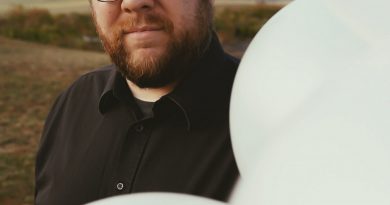A Chat with Eternal Heart (11.12.24)
The brainchild of producer/musician Cameron Gaut, Eternal Heart is a project pushing the borders of reggae music to its non-conventional edges. Blending Indian classical, reggae and dub sounds, Eternal Heart reaches far beyond the realm of words and into that area of the brain where only sound makes sense. We speak with US-based Cameron Gaut about his album Raga Riddims, upcoming plans, what music means to him and more.
OSR: Eternal Heart is possibly one of the most eclectic artists I have come across with its fusion of Indian classical, reggae and dub. Can you tell us what inspired you to blend these different sounds instead of keeping to a particular genre?
Gaut: Growing up with the internet and a world of music at my fingertips, I was exposed to so many different kinds of music. I remember the first time I heard Indian classical music, it was a song that I’d randomly downloaded from Veena Sahasrabuddhe. It was so meditative, it put me into a sort of trance, and around that time I was getting into meditation. I loved how that music made me feel so at peace.
Before discovering Indian classical, I remember my dad would often play Bob Marley’s Legend album around the house. I loved the mellow vibes of reggae, and later discovered the psychedelic offshoot of reggae known as dub, which was cool to me because of all the effects like delays, phasers and spring reverbs. One of my favorite albums as a teenager was Cheb I Sabbah’s Krishna Lila, which was a perfect blend of Indian classical and reggae/dub. There wasn’t anything else like it. That album was a huge inspiration to me. I wanted to hear more music like it, so I started to produce it myself. At first it was just a few songs that sat on my computer for a while. Then I started creating more and more, and before I knew it, I had enough songs for an EP, and then kept going, and then I had an entire album.
OSR: What does music mean to you?
Gaut: That’s a deceptively simple but deep question. At the surface level, music is just something we listen to for pleasure. Going a little deeper, we find that music is actually organized vibrations of air molecules that have an emotional impact on the listener. Beyond that, music is a tool for altering or enhancing states of consciousness. I believe the whole of reality is a kind of music. We know that at a quantum level, reality is composed of vibrating energy. Everything is vibration, music included. What we call music is the vibrations that we can detect with our ears, which are tuned to a limited range of frequencies. Each of our senses are essentially vibration detectors tuned to different frequency ranges. So, in a sense, it’s all music. The tones we hear in music have mathematical relationships with each other, which is what differentiates music from noise. Musical scales are a kind of sacred geometry that are based on rules of symmetry, resonance and harmonic ratios. Music is audible sacred geometry that can resonate in our bodies to affect different states of consciousness. How amazing is that?
OSR: What can you tell us about your album Raga Riddims? Was there any particular theme, backstory or inspiration for the album?
Gaut: What I can tell you about Raga Riddims is that it was made possible by some amazing musicians who recorded for the sample libraries I used. I couldn’t have made this album on my own without access to these sample libraries. Producing this album was kind of like being a DJ, mixing and matching music from a wide variety of sources. I wish I could credit the instrumentalists and vocalists from these sample libraries, because their playing is truly virtuosic. Although I did record a lot of my own instrumentation (bansuri flute, guitar, bass, piano, etc), I can’t take credit for a lot of the other instruments. It’s a fun time to be a producer, with access to so many worlds of sound through sample libraries.
OSR: Most people aren’t able to choose a favourite or least favourite track on their albums. If you had to choose, which would be your favourite and least favourite track and why?
Gaut: True, it’s a hard choice. I’d say my favorite track is one of the first that I made for the album, ‘Infinite Creation’. I absolutely love the bassline. Although I don’t dislike any of the songs, I have started to think maybe ‘Midnight Mystic’ is too long.
OSR: What do you hope people take from your music and Raga Riddims?
Gaut: It is my hope that listening to this album inspires you to seek out more Indian classical music. I feel like it’s such an under-appreciated niche genre of music. I hope this album serves as a bridge to a new world of music that you’ve likely never heard before.
OSR: What does Raga Riddims mean to you? What do you take from it?
Gaut: The name Raga Riddims is a combination of Indian and Jamaican terms. “Raga” is a melodic framework in Indian classical music; it’s like a set of musical phrases that follow certain rules about which notes can be played when and in what order, with freedom for the individual musician to improvise. A “Riddim” is the instrumental accompaniment or rhythm section in a reggae song. I wanted to convey in just two words what the album was all about, and I think I succeeded in that.
OSR: Creating albums, particularly one with such a diverse sound, must be tricky. Did you face any challenges when creating Raga Riddims and if so, how did you overcome them?
Gaut: Thankfully, the production of this album was relatively easeful, though it took the better part of a year to complete. The tricky part was finding time to devote to this album because I’m not a full-time musician. Between supporting a family with my main line of work (web development) and other life obligations, I often would stay up late into the night to work on music.
The other challenge was making the decision to release this music under my “Eternal Heart” project. I had this idea that I should stick to one genre. After sitting on the album for months, I finally decided that I was not going to create a new artist persona for this album, and that I would release it as “Eternal Heart”. I am Eternal Heart, and I am not limited by one genre. If the album doesn’t resonate for fans of my ambient music, they should check out my “Eternal Heart Ambient” playlist on Spotify. Perfect for massage, yoga, meditation, or any situation where you want to relax.
OSR: If you had to introduce a new listener to your music, which song would you recommend?
Gaut: It depends on what mood they were in. Before releasing this album, my “Eternal Heart” project consisted only of ethereal ambient flute music. So, if you’re looking for good background music for massage, meditation, yoga, etc, I’d recommend ‘Grace’, it’s one of my favorites. But if you want to groove to a head-nodding beat and bassline, check out ‘Inna Vision’ from this new album.
OSR: What advice do you have for new musicians?
Gaut: Have fun playing without expectations. It’s good to have goals too, but if you’re not having fun along the way, you’ll probably give up before you fully blossom as a musician. Make music for yourself first before anyone else. That will ensure that your music is authentic. The world’s best music was made as an extension of somebody’s soul. So much of modern music is just “product”, and the quality suffers because it lacks soul.
OSR: What can we expect from Eternal Heart in the future?
Gaut: I’ll be working diligently on regularly releasing new music, whether it’s ambient Indian classical, dub or something else, who knows! I’ve been playing around with producing lots of different kinds of music, like soul, lo-fi, jazz, and more. We’ll see what I end up releasing as “Eternal Heart”. Though I believe it’s important to find one’s niche, I don’t want to pigeonhole myself into any one particular genre. The key for me is allowing myself to evolve, while staying true to my core themes of music that speaks from the soul.
OSR: Do you have a message for our readers?
Gaut: If you made it this far into this interview, I just want to say thank you for staying curious and open to new music! If you like my sound, please consider joining my mailing list or buying some music on my Bandcamp. It’s all right here on my Linktree: https://linktr.ee/eternalheart
Many thanks to Eternal Heart for speaking with us! Find out more about Eternal Heart on his official website, Facebook, Instagram and Spotify.
This artist was discovered via Musosoup #sustainablecurator
Listen to more reggae music on The Other Side Reviews Reggae playlist:


